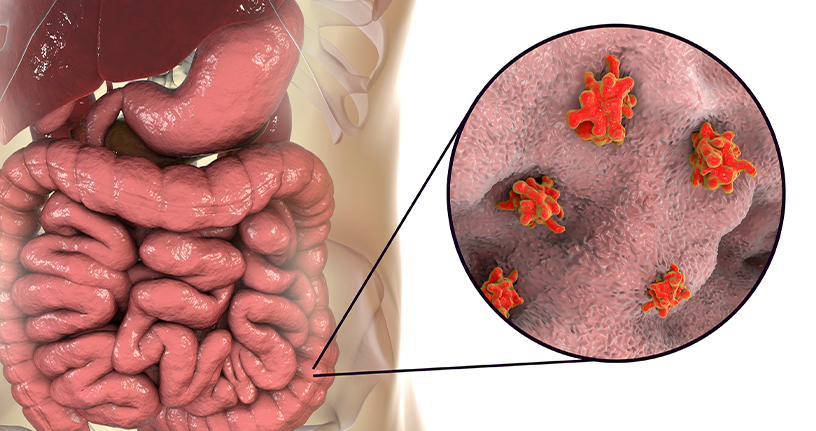Amoebiasis or amoebic dysentery is a form of infection of the intestines caused by a parasitic amoeba Entamoeba histolytica (an anaerobic parasitic amoebozoan). Parasites from the Amoeba group cause amoebic infections, the most common being entamoeba histolytica. These infections primarily affect the intestines but can also affect the functions of other organs, such as the liver, lungs, and brain. Some effective medications that are usually prescribed or anti-amoebic solutions include Flagyl 400mg, Nizonide 500 mg, Tiniba 500 mg, and Tiniba 300 mg.
What is amoebic infection?
Amoebic infection is an infection of the intestines that is caused by the microscopic protozoan parasite Entamoeba histolytica. It spreads through human feces and can affect anyone. People living in dirty or unhealthy environments are at high risk of amoebiasis dysentery infection. This infection is probably transmitted in areas with poor sanitation, contaminated drinking water, and dirty or unhealthy foods. In such places, many people with diarrhea may be infected by amoebic dysentery as well. Prevalence rates of amoebic infections are highest in the Indian subcontinent, Indonesia, sub-Saharan and tropical regions of Africa, and areas of Central and South America, although more studies are needed to understand the prevalence of this disease.
Amoebic symptoms
It is estimated that only 10-20 percent of infected people develop amoebic symptoms. Sometimes, people infected by amoebiasis can show no, mild, or severe symptoms. Some obvious symptoms of this condition may include abdominal pain, lethargy, weight loss, weakness, colonic ulcerations, diarrhea, or bloody diarrhea. Fulminant amoebic dysentery is often serious and can be fatal. Some critical complications of this condition are perforation of the colon, colonic ulcers, and chronic carriage.
Effective amoebic treatment
Diagnosis of amoebic condition is recommended after stool examination using microscopy, but it can be difficult to distinguish. Various flotation or sedimentation procedures have been developed. After microscopic examination, these procedures can help you recover the cysts from fecal matter. There are several effective anti-amoebic drugs available on prescription. Some highly recommended medicines for this disease include:
Flagyl 400 mg: It is an antibiotic medicine recommended to treat infections caused by bacteria and parasites. Flagyl 400mg tablet can treat infections of the liver, brain, teeth, heart, lungs, bones, stomach, intestines, vagina, and skin. It also prevents an infection after surgery. It is a prescription drug, so the dosage and duration of medication will depend on your condition after a medical examination.
Nizonide 500mg: It is also an effective antiparasitic medication widely recommended for treating diarrhea and worm infections. Nizonide 500mg tablet can restrict the parasite’s growth, thus treating Amoebic infection. This medicine inhibits the production of certain chemicals and substances essential for energy metabolism to promote the growth of the parasitic infection. It is a prescription drug, so take the advice of your doctor before taking Nizonide tablets.
Tiniba 500 & 300mg: This antibiotic helps your body fight infections caused by bacteria and parasites. Tiniba 300mg and 500mg tablets are highly recommended to treat amoebiasis, dysentery, and other infections of the liver, vagina, brain, stomach, intestines, heart, lungs, and skin. This medicine is also prescribed to treat dental infections, leg ulcers, and pressure sores. It can stop the growth of bacteria and makes you feel better quite quickly. It can effectively kill the bacteria and other microorganisms responsible for infections.
Benefits of anti-amoebic drugs
These anti-amoebic drugs help treat many parasitic infections. They work by removing and preventing the further growth of parasites causing the infection. You can take any of these drugs as long as your doctor recommends.
Precautions with anti-amoebic medicines
Prevention of amoebic infections works better with improved sanitation, healthy food, and clean water consumption. There are some precautions that you should undertake while taking anti-amoebic medicines. Patients should avoid alcohol as it may cause some serious symptoms such as flushing, irregular heartbeat, nausea, low blood pressure, thirst, and chest pain. These medicines may be unsafe during pregnancy. Pregnant women must consult a doctor for a prescription to avoid any potential risks.
Similarly, women should use these drugs to treat amoebiasis dysentery but with caution during breastfeeding. In most cases, it is recommended to hold breastfeeding for 12-24 hours to allow the removal of the effects of drugs. Moreover, these anti-amoebic drugs could affect your ability to drive. So, try to avoid driving immediately after taking the medicine.


